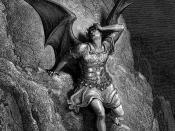Mary Shelley has created a subversive and grotesque God/Man relationship in "Frankenstein." Shelly sets up Frankenstein and, at times, Man in general, to be the monster's God. Shelley's integration with Paradise Lost creates opportunity for making such comparisons. When the monster gives his book review of the found classic, he states, "It moved every feeling of wonder and awe, that the picture of an omnipotent God warring with his creatures was capable of exciting." This is reminiscent of the war he has with Frankenstein when his wishes are refused. He then goes on to relate the story's characters to his own situation.
The plot of the monster's life follows a mutated version of Adam's as he read it in Paradise Lost. At one point he relates, "But it was all a dream; no Eve soothed my sorrows nor shared my thoughts; I was alone. I remembered Adam's supplication to his Creator.
But where was mine?" The monster relates himself to Adam and expects the same treatment from his 'God.' The full realization of the mockery of Adam and Eve is barely missed when Frankenstein decides to relieve Man of the burden of his monster race by refusing to create the monster's bride. Just as he has the power to create, has he the power to destroy. Yet, in the end, the monster is the one in control, and ultimately triumphs in the final chase, outliving his creator.
Just as with Adam, the monster's role is also compared to that of Satan in Paradise Lost: "Many times I considered Satan as the fitter emblem of my condition; for often, like him, when I viewed the bliss of my protectors, the bitter gall of envy rose within me." The monster is like Satan in that he is rejected by the...



More info
Is this an essay? It doesn't seem like that to me! But still that doesn't take your credits away for writing a nice analysis even if short! It would be a good idea if you analyze it deeply and convey more information out of it!
1 out of 1 people found this comment useful.